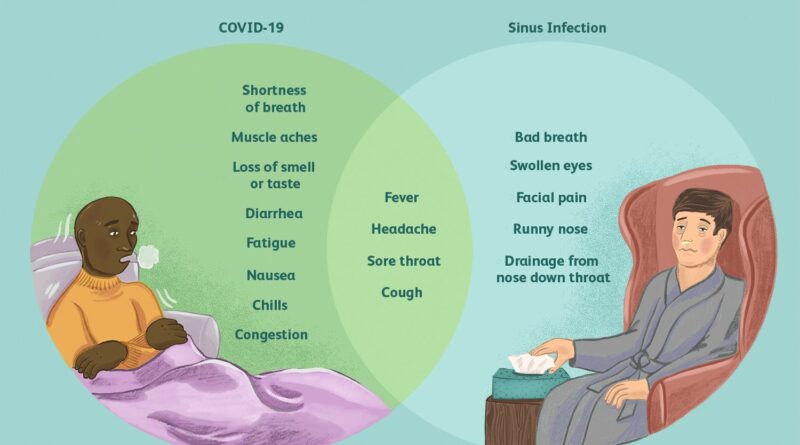Symptoms With Sinus Infection
A sinus infection can be a real pain. The symptoms can include a runny nose, congestion, headaches, and even fever. If you’re dealing with a sinus infection, there are some things you can do to help ease the symptoms.
Some home remedies can help clear out your sinuses and provide relief from the pressure and pain.
Sinus Infection: Causes, Signs, Symptoms, Diagnosis – Dr. Harihara Murthy
If you’re suffering from a sinus infection, you know how miserable it can make you feel. Your head feels like it’s going to explode, your nose is constantly congested, and you can’t seem to get rid of that nagging headache. But did you know that there are other symptoms besides the ones listed above?
Here are some others that you may be experiencing:
-A fever
-Bad breath
-Fatigue
-Dental pain
-Earache
-Nasal discharge that is thick and yellow or green in color
If you have any of these symptoms, it’s best to see a doctor as soon as possible. They can prescribe medication to help relieve your symptoms and get rid of the infection.
In the meantime, there are things you can do at home to help ease your discomfort. Drink lots of fluids, use a humidifier, and take over-the-counter medications like ibuprofen or acetaminophen for the pain.
Can Sinus Infection Cause Nausea in Adults
A sinus infection, also called sinusitis, is an inflammation of the sinuses. The sinuses are air-filled cavities in the bones around the nose. Sinusitis is a common condition and can be caused by a virus, bacteria, or allergies.
It can occur at any age, but is most common in adults. Symptoms of sinusitis include a stuffy or runny nose, pain and pressure in the face, headache, fever, and fatigue. Some people also experience nausea with sinusitis.
Nausea is not a common symptom of sinusitis, but it can occur in some people. The exact cause of nausea with sinusitis is not known, but it may be due to the inflammation of thesinuses causing pressure on the nerves that control nausea (the trigeminal nerve). Nausea fromsinusitis is usually mild and goes away on its own within a few days.
However, if you experience severe or persistent nausea with sinusitis, see your doctor for evaluation and treatment.
Sinus Infection Symptoms Dizziness
A sinus infection, also called sinusitis, is an inflammation of the lining of the sinuses. The sinuses are air-filled cavities in the bones around the nose. Sinus infections can be caused by a virus, bacteria, or fungi.
The most common symptom of a sinus infection is pain and pressure in the face. Other symptoms include headaches, fever, nasal discharge, and fatigue. Some people with a sinus infection also experience dizziness.
Dizziness is not a common symptom of a sinus infection, but it can occur in some people. If you have asinus infection and you experience dizziness, it’s important to see your doctor so they can rule out other potential causes of your symptoms.
Sinus Infection Without Mucus
A sinus infection without mucus is known as a dry sinus infection. This type of infection is less common than a wet, or mucous, sinus infection. Dry sinus infections can be more difficult to treat because the lack of mucus makes it harder for the body to clear the infection.
Treatment usually involves a combination of antibiotics and anti-inflammatory drugs.
Sinus Infection Symptoms Vs Covid
If you’re wondering whether your sinus infection is caused by a virus or bacteria, there are some key differences in symptoms to look out for. With a sinus infection, you’ll typically have thick yellow or green mucus drainage, facial pain and pressure, and congestion. A Covid-19 infection may cause similar symptoms, but can also lead to fever, chills, body aches and pains, and fatigue.
It’s important to see your doctor if you think you may have either of these infections so that you can get the proper treatment.
Are Sinus Infections Contagious
Are sinus infections contagious? The answer is both yes and no. If you have a viral infection, it can be passed to others through contact with respiratory secretions, such as saliva or mucus.
However, if you have a bacterial infection, it’s not typically contagious because antibiotics can kill the bacteria.
Bacterial Sinus Infection Symptoms
Most people with a sinus infection will have at least some of the following symptoms:
-Facial pain or pressure, especially around the forehead, cheeks and eyes
-A feeling of fullness or congestion in the ears
-Nasal discharge that is thick and yellow or green in color
-Reduced sense of smell and taste
-Postnasal drip
-Coughing
-Fatigue
If you suspect you have a sinus infection, it’s important to see your doctor for a proper diagnosis.
This is because sinus infections can often be confused with other conditions, such as allergies or the common cold. Treatment for a sinus infection will usually involve antibiotics. In some cases, however, home remedies may help to relieve symptoms.
Viral Sinus Infection Symptoms
Are you feeling run down, tired and achy? Do you have a headache and pressure in your face? If so, you may be suffering from a viral sinus infection.
Viral sinus infections are very common and usually occur after a cold or the flu. The symptoms can be quite debilitating, but luckily there are ways to treat it and feel better.
The most common symptom of a viral sinus infection is a stuffy nose.
This is due to the inflammation of the sinuses which causes them to produce more mucus than usual. The mucus then gets trapped in the nose, leading to congestion. Other symptoms include:
-Aching in the face
-Pain in the forehead or around the eyes
-Yellow or green discharge from the nose
-Bad breath
-Fever
If you suspect you have a viral sinus infection, it’s important to see your doctor for proper diagnosis and treatment.
In some cases, a bacterial infection can develop on top of the virus, so it’s important to rule that out with a swab test. Treatment for a viral sinus infection includes rest, lots of fluids and over-the-counter medication like ibuprofen or acetaminophen for pain relief. Nasal decongestants can also help clear out your stuffed up nose.
If your symptoms are severe or don’t improve after 10 days, make sure to follow up with your doctor as you may need antibiotics for a bacterial infection.
Sinus Pressure
If you’ve ever had a sinus infection, you know how miserable the pressure and pain can be. Your head feels like it’s going to explode, and the pressure is so intense that it can actually make your teeth hurt. Sinus pressure is caused by inflamed sinuses, which can be the result of an infection or allergies.
The good news is that there are things you can do to relieve the pressure and get some relief.
One way to reduce sinus pressure is to take a decongestant. This will help to shrink the swollen blood vessels in your nose and allow drainage to occur.
You can also use a saline spray or nasal irrigator to flush out your sinuses and help reduce congestion. Another home remedy for sinus pressure is placing a warm, wet towel over your face several times a day. This will help promote drainage and reduce inflammation.
If home remedies don’t seem to be helping, see your doctor. He or she may prescribe a short course of oral steroids or antibiotics if an infection is present. If allergies are the cause of your sinusitis, you may need allergy shots or prescription medication to control them.
In severe cases, surgery may be necessary to improve drainage from the affected sinuses.
No one enjoys dealing with sinus pressure, but fortunately there are ways to find relief. Try some of these home remedies and talk to your doctor if they don’t seem to be helping.
With time and patience, you’ll hopefully soon be feeling better!

Credit: www.nasoneb.com
What are the 4 Main Symptoms of Sinusitis?
Sinusitis is a condition that occurs when the sinuses become inflamed. The sinuses are the cavities in the skull that are responsible for producing mucus. When these cavities become inflamed, they can produce a number of symptoms, including:
1. Pain in the Sinuses: This pain is typically felt around the eyes, forehead and cheeks. It may also be felt in the teeth and jaw. The pain is often worse when bending over or lying down.
2. Congestion: Inflammation of the sinuses can cause congestion and difficulty breathing through the nose.
3. discharge: This discharge is usually thick and yellow or green in color. It can drain from the nose or down the back of throat causing post-nasal drip.
4.. Fever: A fever may be present with sinusitis, although it is more common in children than adults.
What are the 3 Symptoms of Sinusitis?
Sinusitis is an infection of the sinuses that can cause a number of symptoms, including headaches, facial pain and pressure, a stuffy nose, and more. While sinus infections are generally not serious, they can be very uncomfortable. Here are three common symptoms of sinusitis:
1. Headache: A throbbing headache is often one of the first signs of sinusitis. The pain is usually worse in the morning or when bending over. It can also be accompanied by pressure or tenderness in the face.
2. Facial Pain and Pressure: This is another common symptom caused by the inflammation of the sinuses. It may feel like your whole face is swollen or you have a toothache. You may also notice that your eyes are sensitive to light and watery.
3. Stuffy Nose: A stuffy nose is one of the most frustrating symptoms of sinusitis because it can make it difficult to breathe through your nose. You may also notice that your sense of smell is diminished and that you’re producing more mucus than usual.
How Long Does a Sinus Infection Last?
A sinus infection, also called sinusitis, is an inflammation of the sinuses. The sinuses are air-filled cavities in the skull that are connected to the nose. They help to filter out bacteria and other particles from the air we breathe.
When these cavities become inflamed, it can cause a buildup of mucus and pressure in the head, leading to pain and congestion.
Sinus infections can be acute or chronic. Acute sinusitis usually lasts for 4 weeks or less and is often caused by a viral infection such as a cold or flu.
Chronic sinusitis lasts for 12 weeks or more and is usually caused by allergies, structural problems in the nose, or an autoimmune disorder.
There are several things you can do to help relieve the symptoms of a sinus infection:
– Drink plenty of fluids to thin out mucus
– Use a humidifier to moisten the air
– Avoid irritants such as smoke and dust
Conclusion
Sinus infections are among the most common respiratory illnesses. They’re usually caused by a virus, and often go away on their own without antibiotics. But sometimes sinus infections can become serious, especially if they’re caused by bacteria.
Symptoms of a sinus infection include congestion, runny nose, facial pain and pressure, headache, and fever. If you have these symptoms for more than a week or your fever is higher than 102 degrees Fahrenheit, you should see a doctor.




